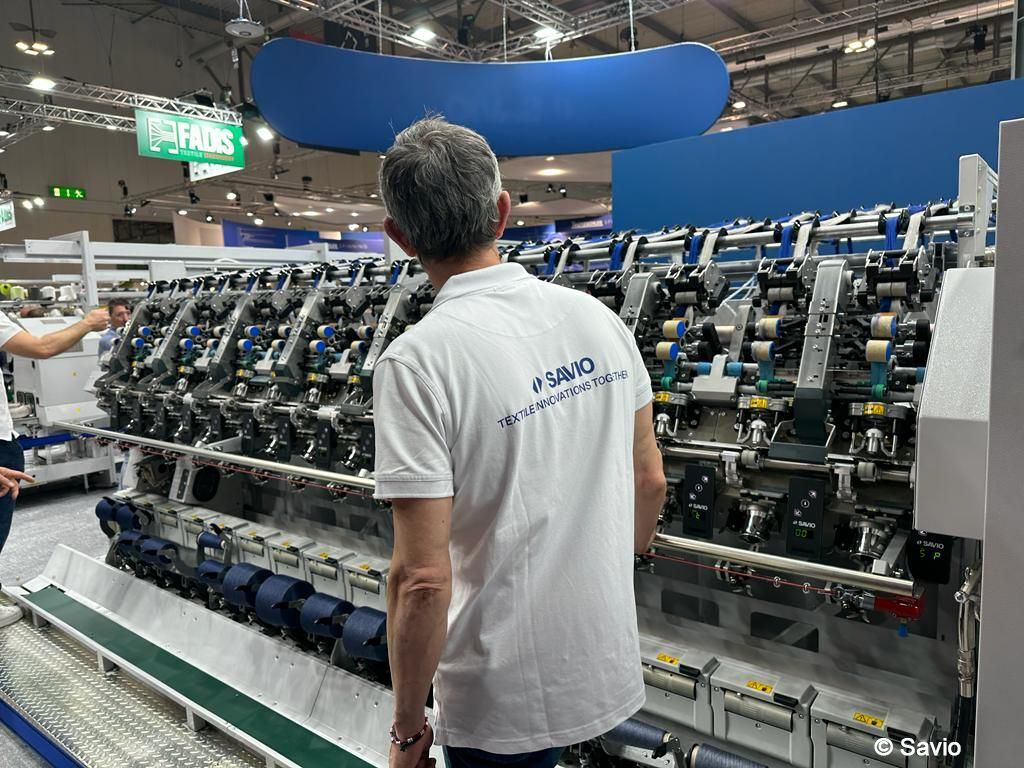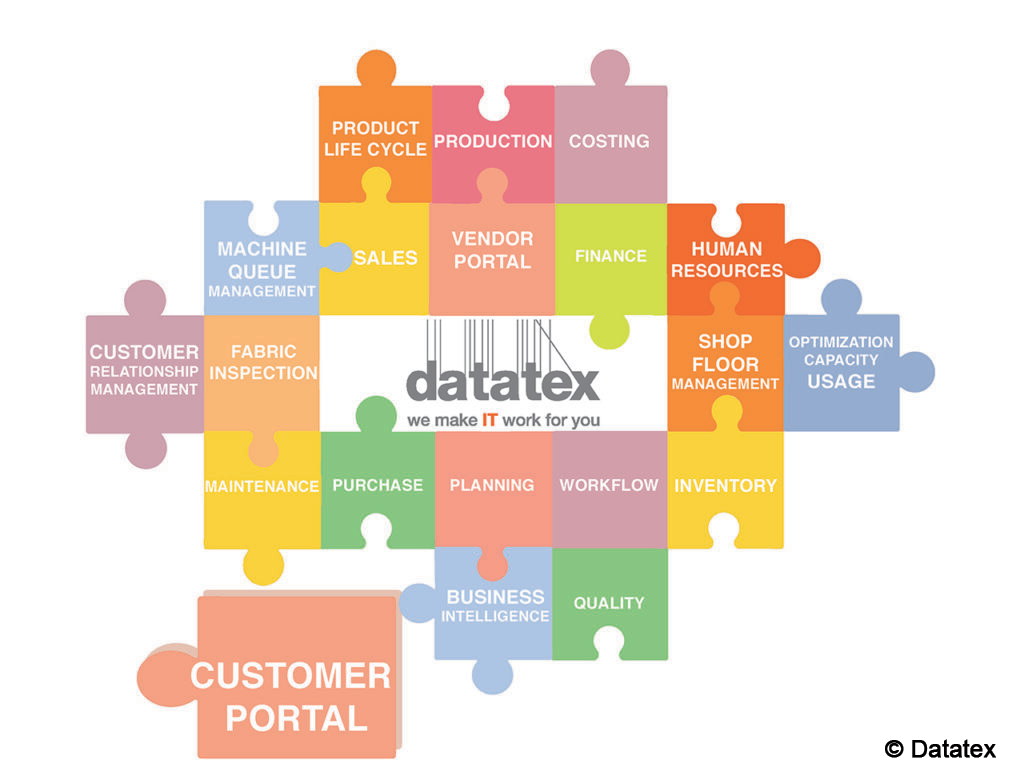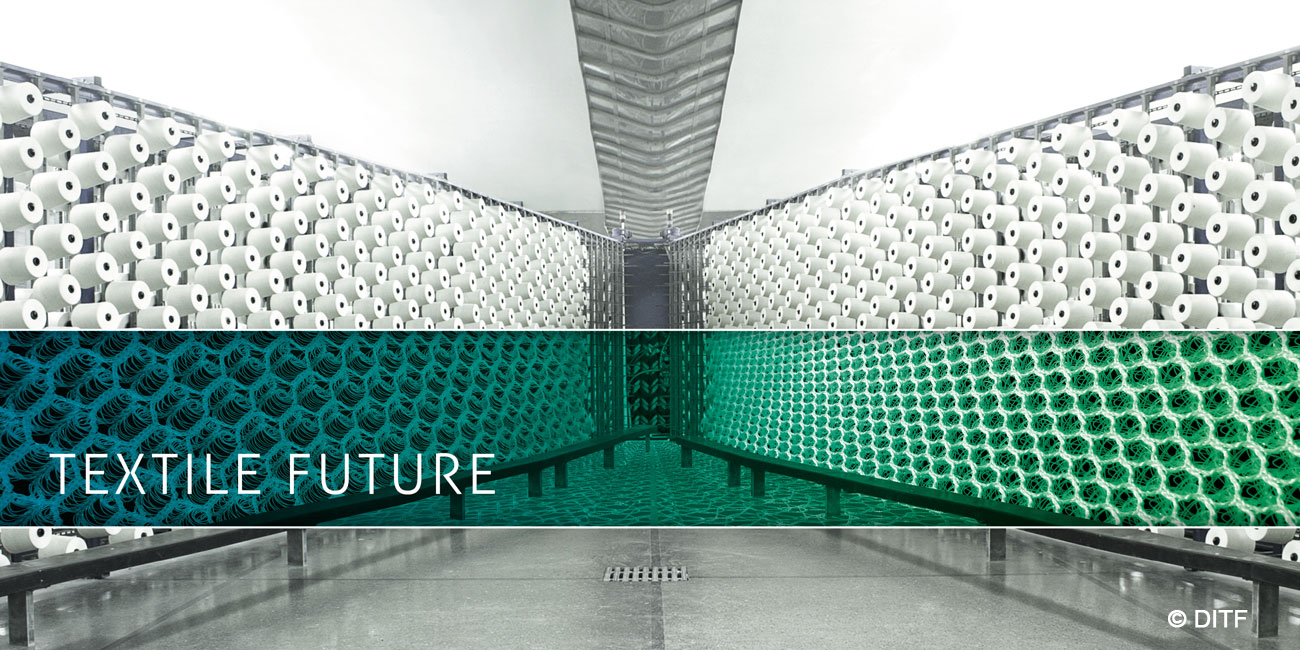How will today’s new technologies shape the textile industry of tomorrow and are we truly on the cusp of major change?
This was the theme explored during the ITMAconnect Automation and Digital Future webinar, first broadcasted on 29 February 2024 and now available on ITMAconnect.com for subscribers.
Chaired by Madelaine Thomas, Head of Content for World Textile Information Network (WTiN), the webinar brought together Mauro Moro, CEO of spinning machinery leader Savio, Thomas Fischer, Deputy Director of Management Research at DITF Denkendorf and Shannon McCarthy, Head of Business Development for software specialist Datatex Consulting.
In examining the obstacles to adopting digital technologies, it was observed that the fractured and complex nature of the global textile industry constituted the main barrier.
“We start with a bale of raw material somewhere in the world and move it around while transforming it over and over again,” said Fischer. “We don’t have a digital twin for the entire supply chain and everybody has to start over again doing quality inspection at the start of their own processes and then shipping the result on again. We don’t have a system where all the players can rely on the data from their suppliers. In addition, there are different countries, standards, ways of working and attitudes to sustainability across this global network.”
When processes constantly move to cheaper regions, it’s difficult to have global legislation, he added, suggesting that what is needed is a move from producing a million t-shirts and selling them afterwards, to near-shoring and producing only what has been sold through the on-demand-production of individual items in terms of shape and colour.
“This changes the business model and is also a sustainable solution,” Fischer said. “It’s a shift that will take time but is being pushed by the technology and supported by legislation.”

Looking specifically at automation within individual mills, Moro said that the full potential of today’s advanced machines is still not being realised by the majority of manufacturers.
“Costs are critical in spinning, which is at the beginning of the supply chain in which much of the margin is created at the retail level,” he said. “There are, however, a lot of costs that can be avoided with proper management of machines and processes, in terms of efficient energy consumption and set-up and maintenance times, as well as labour usage.
“It is now possible to fully track both incoming and outgoing quality, and today a machine is no longer passive and waiting for instructions, with many automatic actions now embedded. A lot has been achieved in the past 20 years, but what is really driving the higher use of automation now, is the lack of available machine operators and high wages in the main textile manufacturing regions.”

Datatex is supplying an ever-evolving tool kit to support decision makers across many areas of the supply chain and McCarthy noted that the digitalisation of product development, for example, has streamlined practices dramatically.
“Many of the costs associated with physical sampling and shipping have been eliminated and software systems can then share product data for hand-offs along the supply chain,” he said. “Advanced shipping notices, for example, provide manufacturers with the ability to more accurately schedule production. Software moving from the office to the factory floor then streamlines data acquisition, providing realtime visibility of status and quality and the early recognition of potential problems. As a result, many planning departments are much smaller than they were ten years ago, while often dealing with many more products and orders.”
In response to a question about sustainable dyeing and finishing, it was observed that this energy-intensive sector is now likely to experience the kind of shift that is already happening in printing, following the introduction of many advanced new technologies. At ITMA 2023 in Milan, digital printing technologies filled an entire hall, having been virtually unrepresented eight years previously at ITMA 2015.
Another question asked if digitalisation and automation wasn’t having the opposite effect to that intended, in enabling the rise of even bigger and faster fashion brands releasing many thousands of new items of cheap clothing into the market on a daily basis.
While acknowledging this was currently the case, the panellists stressed that technology is largely neutral and reliant on the intentions of those using it. It can equally support ‘slow fashion’ – the development and production of individualised, long-lasting on-demand products – and will also be used to gather reliable data on environmental and life cycle issues that will both heavily influence public opinion and galvanise legislators into action.
Moro, however, commented that sometimes legislation can be remote from business and the reality of what technology can do, forcing the adoption of rules that are sometimes not viable.
“We are in need of more harmonised and common global targets, but currently face different legislation in different areas of the world,” he said.

Meanwhile, the sorting of textile waste is a field where automation is poised to have an immediate impact, with the European Union banning its landfilling or incineration from 2025, and a lot of new technology is now being adopted from other industries here.
“Europe will suddenly become a region with a lot of raw material and the more waste that is collected the more sense it will make to establish recycling hubs,” Fischer said. “This will be a really disruptive and systemic change that will require collaboration across the supply chain and a shift in mindset. It’s about closing the loop at the information level.”
In summary, McCarthy said that the sustainable mass manufacturing factories of the future will be closer to the end customer, with clean power generation, LEED building certification, water reclamation facilities and fully integrated technologies with advanced planning and scheduling.
AI-based digital engineering will also result in predictable quality and the operational expertise of a long-established plant can now be transferred to a brand new one to run at the same quality level from Day One.
“AI makes it possible to bake expertise into processes from the outset,” Fischer observed, and McCarthy added that demand forecasting will eventually morph into simply digital production scheduling based on years of accumulated data.
The panellists agreed that the long term impact of AI is unpredictable, but Fischer said that digital networks of smaller players and micro-factories will eventually arise, with centralised AI predicting which partner has availability and immediately responding at a regional level.
The industry, however, will not move in months, Moro observed.
“Mills have still not adapted to the present level of available technology, so we have now got to get the industry up to that,” he said.
A recording of the webinar is available on ITMAconnect on-demand for subscribers. If you are not a subscriber, register for an ITMAconnect visitor account now for just €25 (excluding VAT).

featuring Madelaine Thomas, Shannon McCarthy, Thomas Fischer, and Mauro Moro

Access your ITMAconnect account now
until 14 November 2026.

Purchase an ITMAconnect visitor ticket at EUR 25 (VAT at prevailing rate to be added if applicable) to access the platform until 14 November 2026.
Share this page
Stay Updated on Industry Developments
Featuring products and exhibitors on ITMAconnect.
View More Articles